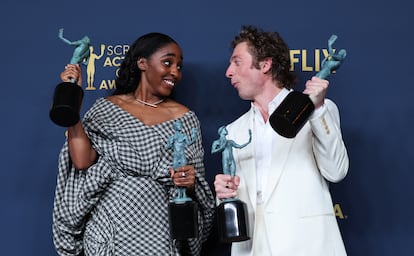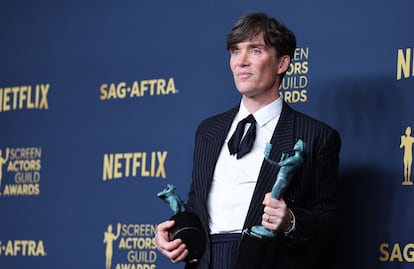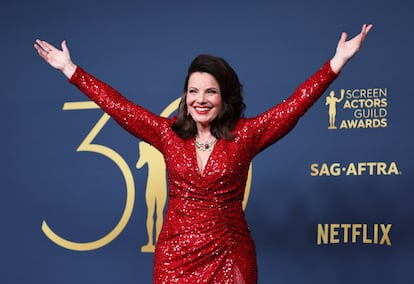SAG Awards honor ‘Oppenheimer’, ‘The Bear’ and Pedro Pascal amid reflections on 118-day-long strike
There were few surprises at the 30th edition of the Screen Actors Guild Awards, except for the Chilean actor’s win. The union’s president, Fran Drescher, thanked all the ‘champions’ for supporting the industrial action

The Screen Actors Guild Awards on Saturday in Los Angeles was about much more than the actors. As the most important performers of today celebrated the awards of their SAG-AFTRA union, there was reflection on the 118-day-long strike that captured not only Los Angeles, but the world. Some 160,000 actors — from the biggest names in the world to background actors — went on strike last summer, first joining screenwriters, before continuing on their own. And they achieved their goal: after months of struggle, strikes and job losses, they secured a billion-dollar contract that raised salaries and provided guarantees on the use of artificial intelligence.
On Saturday night at the Shrine Auditorium, the union not only presented their annual awards, which were marking their 30th anniversary, they celebrated that agreement and demonstrated that there is strength in unity. And it was a big celebration: for the first time, the award ceremony was broadcast on Netflix. As a result, there were no ads or too many pauses. In two hours and 10 minutes, Oppenheimer, Succession, The Bear and Beef picked up the awards they were tipped to win, while Barbra Streisand received a lifetime achievement award. The big surprise was Chilean actor Pedro Pascal, who became emotional after winning Best Actor in a Drama Series.
Pascal — who won for his role as Joel in The Last of Us — was not the only one who was shocked. It also came as a surprise to the stars of Succession, who have been sweeping the awards for best actors this season. The series about New York tycoons did, however, win Best Drama Ensemble, an award that only the Critics’ Choice Movie Awards hands out.
The Bear won Best Comedy Series, while Oppenheimer won Best Ensemble; with Cillian Murphy and Robert Downey Jr. winning Best Actor and Best Support Actor, respectively. Best Supporting Actress — which Penélope Cruz was also nominated for thanks to her role in Ferrari — went to Da’Vine Joy for The Holdovers. The big question was who would win Best Actress, as the film awards — like the Oscars — do not have separate categories for comedy and drama. In the end, Lily Gladstone (The Killers of the Flower Moon) won over Emma Stone (Poor Things), which may be a sign of what could happen at the Academy Awards on March 10.

The awards in the television category followed an unsurprising pattern. The stars of The Bear, Jeremy Allen White and Ayo Edebiri, won Best Actor and Best Actress in a Comedy Series, respectively. And in the Limited Series category, Ali Wong and Steven Yeun picked up the awards for their role in Beef.
There were more surprises when it came to TV dramas. Elizabeth Debicki, who plays Princess Diana in the last two seasons of The Crown, beat Sarah Snook, who plays the devious Shiv in Succession. And Pedro Pascal beat Billy Crudup from The Morning Show, as well as Kieran Culkin, Brian Cox and Matthew Macfadyen, from Succession.
“This is wrong for a number of reasons: I’m a little drunk, I thought I could get drunk,” said Pascal upon accepting the award. “I’ve been in the union since 1999, so this is an incredible honor.” He congratulated the other nominees, joking, “I can’t remember any of your names right now.” And ended his speech by saying: “I’m going to have a panic attack and I’m going to leave.” At the post-acceptance speech interview, Pascal was asked if he was going to rub the award in Culkin’s face, as Culkin has won the award in almost every award gala. “I’m going to make out with Kieran,” he jokingly replied. “That’ll be my revenge.” He added that he was “genuinely surprised” and that he’d sobered up. “I’ve been drinking tequila [...] just to keep the cold away. I’m sober now,” he said.

Idris Elba hosted the awards, but did not do more than the opening and closing speech, and a couple of other appearances. Elba was friendly without being sarcastic, recommending the actors “don’t say anything you wouldn’t say in front of Oprah [Winfrey].”
The gala was a sober, calm and efficient affair. The actors who died in the past 12 months were remembered, from Matthew Perry and Tina Turner to Michael Gambon, Suzanne Somers, Harry Belafonte, Treat Williams, Chita Rivera, Ryan O’Neal and Alan Arkin. But this time, there was no uncomfortable applause of the audience. The pairs of award presenters also worked well, such as Elijah Wood and Sean Austin, 20 years after the triumph of The Lord of the Rings, where they were Frodo and Sam; Greta Lee (The Morning Show, Past Lives) and Troy Kotsur (Koda), who conversed lovingly in sign language; and a nervous Melissa McCarthy next to Billie Eilish, whom she asked to autograph her forehead, so as not to ruin her dress. But it was the trio of the night that really triumphed: Meryl Streep, Emily Blunt and Anne Hathaway, in a scene reminiscent of The Devil Wears Prada, where it was joked that Streep was like her frosty character, Miranda Priestly.
Barbra Streisand, 81, was presented with the Lifetime Achievement Award by her friends, Jennifer Aniston and Bradley Cooper, and on the same stage where she gave her first big concert in 1963. “She did not just pave the way for us women — she bulldozed the clearing for us,” Aniston said of the pioneer. Streisand herself remembered her beginnings, sitting in her bed in Brooklyn, eating ice cream and reading film magazines, and developing a crush on Marlon Brando, whom she saw at the movies for 25 cents. “I didn’t like reality. I wanted to be in the movies. Even though I knew I didn’t look like the other women on the screen — my mother said, ‘You better learn to type,’ but I didn’t listen. And somehow, some way, it all came true,” said Streisand.

But the nearly four-month-long strike and the actors’ battle against the studios was the backbone that shaped the entire ceremony. Before opening the night’s awards, Michael Cera said how he had obtained his SAG membership card when he was only 13 years old. And joked that the adults treated him as a peer, even if he couldn’t touch his earnings. Colman Domingo (Rustin, The Color Purple) and Hannah Waddingham (Ted Lasso) shared their experiences as actors, and then gave way to Idris Elba. The nigh’ts winners also spoke of the struggle, including Kenneth Branagh, who, speaking on behalf of the entire cast of Oppenheimer, recalled how they left the red carpet and did not see the film when it premiered, as that was the same day the strike was declared: “Thank you for fighting for us, thank you for every SAG-AFTRA member whose support and whose sacrifice allows us to be standing here better than we were before,” he said.
The union’s president, actress Fran Drescher, also addressed the audience, and thanked “the hardest working guy in show business, our SAG-AFTRA executive director Duncan Crabtree Ireland.” She also thanked Netflix, which has gone from public enemy number one to partner. “And an especially big thanks to Netflix for inviting the SAG awards to their platform so this event can be viewed all over the world including my parent’s condo in South Florida!” she said.
Drescher also had moving words for her fellow actors: “You are the champions. You survived the longest strike in our union’s history with courage and conviction. The journey was arduous, came with great sacrifice and unrelenting stress. Your collective dignity and perseverance to stand up and say, ‘We deserve better because we are better,’ resulted in an historic ‘Billion Dollar Deal.’ [...] This was a seminal moment in our union’s history that has set the trajectory for many generations to come. Not afraid but brave, not weak but empowered, not peons but partners!” And, blowing kisses from the stage, she left the stage. She knew that the show must go on.
Sign up for our weekly newsletter to get more English-language news coverage from EL PAÍS USA Edition
Tu suscripción se está usando en otro dispositivo
¿Quieres añadir otro usuario a tu suscripción?
Si continúas leyendo en este dispositivo, no se podrá leer en el otro.
FlechaTu suscripción se está usando en otro dispositivo y solo puedes acceder a EL PAÍS desde un dispositivo a la vez.
Si quieres compartir tu cuenta, cambia tu suscripción a la modalidad Premium, así podrás añadir otro usuario. Cada uno accederá con su propia cuenta de email, lo que os permitirá personalizar vuestra experiencia en EL PAÍS.
¿Tienes una suscripción de empresa? Accede aquí para contratar más cuentas.
En el caso de no saber quién está usando tu cuenta, te recomendamos cambiar tu contraseña aquí.
Si decides continuar compartiendo tu cuenta, este mensaje se mostrará en tu dispositivo y en el de la otra persona que está usando tu cuenta de forma indefinida, afectando a tu experiencia de lectura. Puedes consultar aquí los términos y condiciones de la suscripción digital.








































